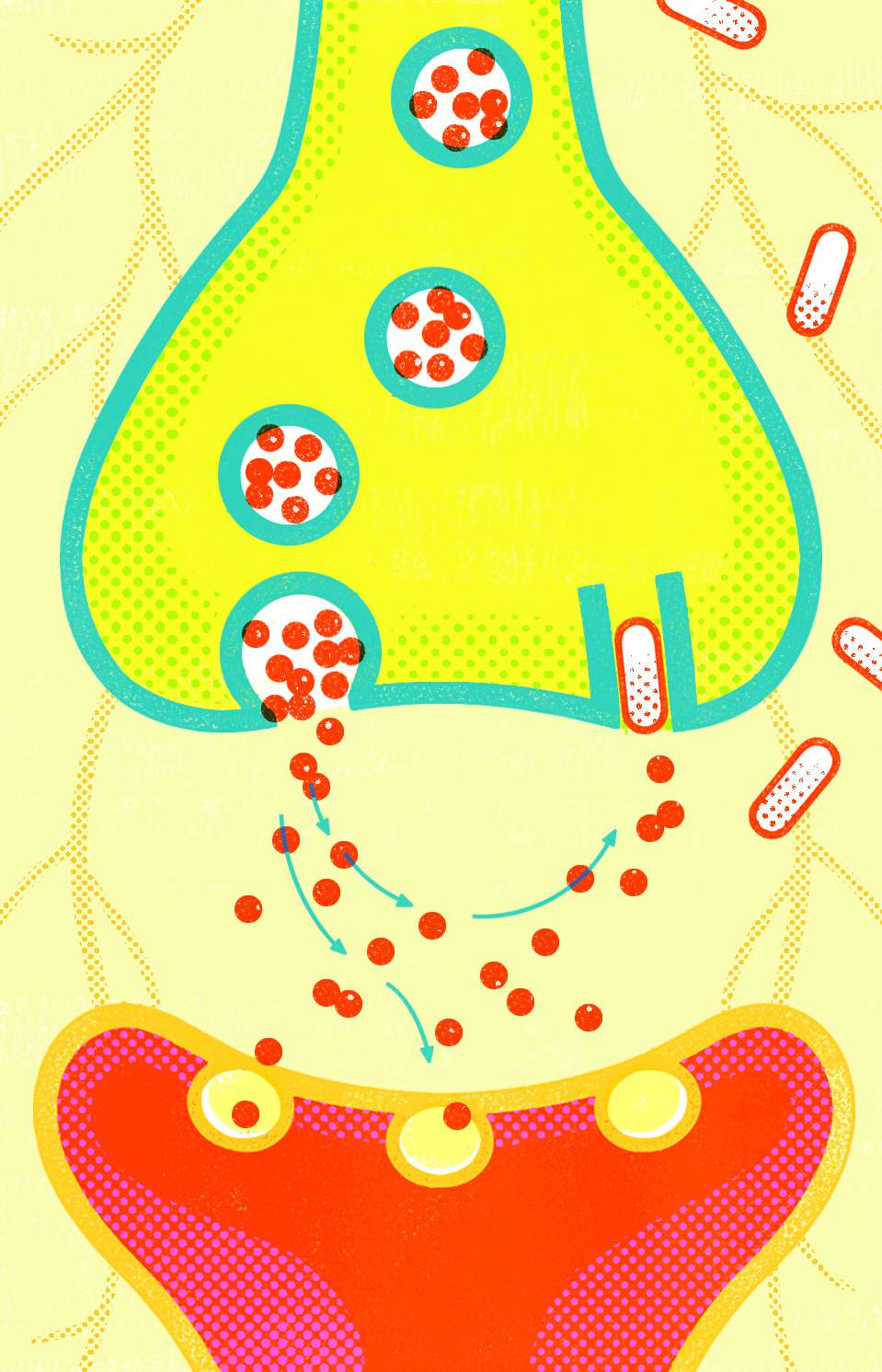It’s famous for keeping your emotions on an even keel—but that’s not all serotonin does. “We’re learning more about serotonin every day,” says Brian Barnett, MD, a staff psychiatrist at the Cleveland Clinic. “The more we research it, the more we realize the complex roles it plays.”
The main building block for serotonin is an essential amino acid called tryptophan. When you eat foods that contain the nutrient— such as turkey, bananas, eggs, nuts, and cheese—some of it is absorbed into the bloodstream and travels to the brain, where it’s converted to serotonin. But the vast majority of your body’s serotonin supply (over 95 percent!) is produced in your gut. And even more interesting: These two pools of serotonin never mix because serotonin doesn’t cross the blood-brain barrier. “Despite the fact that they are identical, they don’t talk to each other,” explains Patricia Ducy, PhD, associate professor of pathology and cell biology at Columbia University Irving Medical Center.
RELATED: What Are Brain Zaps? A Psychiatrist Explains the Antidepressant Withdrawal Symptom
Your stashes of serotonin function differently, too: In the brain, the chemical works as a neurotransmitter, helping neurons communicate. In the gut, it acts like a hormone, aiding digestion; leftover serotonin that slips into the bloodstream appears to affect a variety of processes in ways scientists are just beginning to uncover.
Mind Matters
Let’s start with the job serotonin is most known for: linking your thoughts to your feelings. “Serotonin helps us gauge and understand each other’s emotions, like whether someone’s aiming to hurt us or if they come in peace,” says George Papakostas, MD, a psychiatrist at Massachusetts General Hospital. It’s believed to be one of the most ancient neurotransmitters, he adds, signaling to our early ancestors when they were safe and when they needed to run like hell to survive. Considering that, it’s easy to see why serotonin plays such a vital role in regulating your mood, allowing you to toggle from a calm-and-content frame of mind to an anxious state for self-protection, and back again.
RELATED: Pregnant Woman Aren't Supposed to Take Antidepressants—Here's Why I Did Anyway
If serotonin isn’t able to do its job, mental health issues can arise. “Serotonin connects this superhighway between thoughts, emotions, and defenses. When this info highway becomes dysregulated, you can have a mood or anxiety disorder,” says Dr. Papakostas.
Scientists don’t yet know what causes this dysregulation. But what they do know is that eating more foods rich in tryptophan, in an effort to get the brain to produce more serotonin, probably isn’t the way to fix it. For starters, most of us are already getting plenty of the amino acid, says Ducy. “Tryptophan is in so many foods that you’d have to work really hard to have a deficiency.” Plus, tryptophan has to compete with other amino acids to get into your noggin. “Imagine a revolving door that amino acids have to go through to enter the brain,” says Randy Blakely, PhD, professor at the Charles E. Schmidt College of Medicine at Florida Atlantic University and executive director of the FAU Brain Institute. “Only so many can get in at once.”
RELATED: The 10 Best Foods to Reduce Anxiety
What’s more likely at play when the serotonin system is “off” is how much of the chemical your brain makes from its normal diet of tryptophan—and also how efficiently the brain’s neurons are storing and releasing that serotonin as it’s needed to do its work.
 serotonin process
serotonin process
Some of the serotonin that’s not used up in the gut makes its way into the blood, where it’s rapidly scooped up by platelets. The body likes to have just the right amount of this peripheral serotonin in circulation— and platelets serve as the perfect little serotonin reservoirs, says Ducy. But the platelets aren’t just storage containers; they use this chemical, too. Serotonin is one of the molecules that these cell fragments secrete to help form clots.
In the past decade, scientists have started to discover what else peripheral serotonin can do, such as impact bone density, regulate metabolism, and possibly even play a role in preventing conditions like type 2 diabetes and obesity. What’s certain, however, is that any serotonin dysregulation that occurs in the gut doesn’t have an impact on serotonin levels in the brain.
Helping Hand
One way to promote healthy serotonin function in your brain could be as simple as heading outdoors. Sunlight might be part of the mechanism that keeps the brain optimally synthesizing and using serotonin. In autopsy studies, serotonin levels in the brains of people who died during the summer are higher than for those who died during the winter. Researchers think sunlight works by increasing the amount of serotonin signaling in the brain, says Dr. Barnett.
RELATED: What Are the Symptoms of Seasonal Affective Disorder?
Another lifestyle strategy believed to boost serotonin is to get plenty of exercise, he adds. In one study, physical activity was shown to increase the firing rates of neurons that use serotonin, which spurs both the synthesis and release of the chemical. Other research has shown exercise increases the amount of tryptophan that enters the brain, which may also lead to a bump in serotonin production.
Finally, a few small studies found that getting a massage may also help. Why remains a question mark, but the benefits are clear: A review of the research found that, on average, massage led to a 28 percent increase in serotonin and a 31 percent increase in dopamine (another feel-good hormone), as well as a 31 percent decrease in the stress hormone cortisol.
“We’re getting to a point where we understand more about serotonin neurons: where they go, what they do, what causes them to do what they do,” says Blakely. “It’s been a revolution for our understanding of the brain’s circuitry.”
To get our top stories delivered to your inbox, sign up for the Healthy Living newsletter
